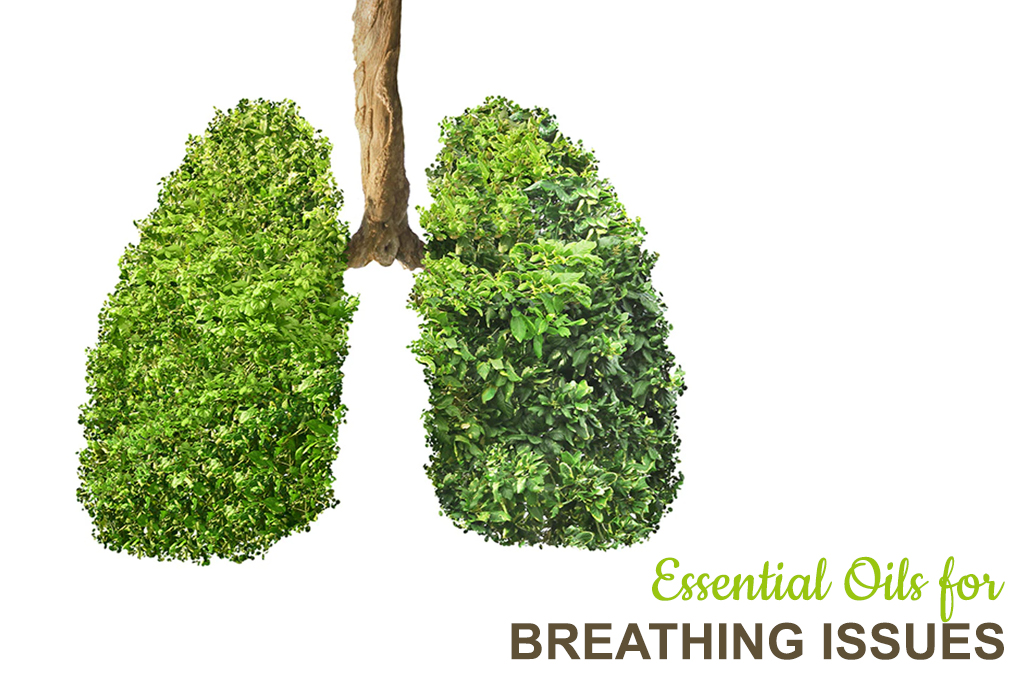Breathing problems are becoming more common in today’s world, and this is mainly due to the deteriorating conditions around which affect air quality. The reality is that there has never been more air pollution than what it is now. This increased air pollution results in increased pollutants and containments found in the air which aggravates respiratory problems.
Those who already suffer from various respiratory conditions are at even higher risk when exposed to constant pollution. Some of the common respiratory conditions include Asthma, Bronchitis, Pneumonia, Corona, Lung Cancer.

Essential oils offer various therapeutic benefits to various health conditions and some essential oils have shown benefits for breathing problems.
BEST ESSENTIAL OILS FOR BREATHING
Eucalyptus oil is one of the most common oils which is regularly used to manage breathing difficulties The anti-inflammatory properties of this oil helps in minimizing symptoms associated with bronchitis or other respiratory conditions. It not only helps in effectively reducing the symptoms but also helps in reducing the severity of these symptoms. The anti-microbial properties help in fighting against bacteria and viruses. Eucalyptus oil can also help stimulate cold receptors of our nose which have significantly improve airflow in nasal and help alleviate breathing problems especially while sick.
Peppermint oil is known to have tremendous benefits when used for breathing issues. Studies have shown that peppermint oil might have a beneficial impact on reducing symptoms of asthmatic attack. The anti-inflammatory properties of this oil can help smoothen our bronchial muscle during an asthma attack. Peppermint oil is packed with antimicrobial and antibacterial properties which can help alleviate symptoms associated with breathing issues or respiratory problems. It can also help reduce symptoms associated with cold.
Ginger essential oil is another commonly used oil for treating symptoms of breathing issues. It can reduce airway constriction which in turn makes breathing easier. Ginger oil is also known to be useful during an asthma attack. The anti-inflammatory properties of this oil are helpful in effectively reducing symptoms of cold and even flu. It can be both used as a stimulating and calming oil.
Frankincense oil has been traditionally valued for its effect on respiratory system and has been used to treat cough, bronchitis and asthma. It is also helpful in treating cold as it helps clear lungs and nasal passages and helps deal with breathlessness problems like shortness of breath. In addition to this, frankincense oil can also help regulate breathing and calm coughing spasms as well.
Tea tree oil acts as an expectorant and can help remove mucus which causes shortness of breath and cough. This oil is also effective in treating symptoms of bronchitis. The antimicrobial properties of this oil helps in defending the body against bacteria and other microbes which can lead to inflammation and other problems. Tea tree oil is helpful in alleviating chest and head congestion. It also helps in clearing out congested nasal passages and thereby helps in making breathing easier.
HOW TO USE
The best way of using Essential oils for breathing issues is to diffuse them in air. You can individually use these oils or use a blend of oils to benefit from varied properties of oils. You can also benefit from steam inhalation in which you can add few drops of oil in hot water and inhale steam for 15 minutes.
FEW THINGS TO REMEMBER WHILE USING ESSENTIAL OILS
- Essential oils are only for external use and should never be ingested
- Store essential oils out of reach of children and store them apart from other products. Some essential oils can be fatal to pets and therefore always research before using them
- Essential oils must ALWAYS be diluted before applying on skin as they are highly concentrated as can cause irritation. You can dilute them in carrier oil of your choice and the max concentration of essential oils should be 3-4%
- Always do a patch test before applying on larger areas of skin
- It is unclear what effects essential oils have on pregnant and breastfeeding women. While some consider them safe, many doctors advice pregnant women to avoid use of essential oils
- Always buy 100% pure essential oils and stay away from fake counterparts as they wont contain same therapeutic benefits
Disclaimer: The information provided on this page is for informational and educational purposes. I am not a medical professional and highly recommend consulting a doctor before using essential oils as part of any medical treatment.
